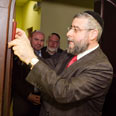
Rabbis work to verify Jewish status
Experiencing trouble proving that you're Jewish? Shorashim center moves heaven and earth in bid to help people whose religion is questioned by Rabbinate. Organization's new Moscow office inaugurated last week
She was a baby at the time, and the new homeland was the only home she knew. When she was about to marry an Israeli man and attempted to register in the Rabbinate, N. discovered that her Jewishness was being questioned. She and her brother – like 320,000 other immigrants, are considered "undefined" Israeli citizens.
N. arrived at the Shorashim center, founded by the Tzohar modern Orthodox organization, and revealed an amazing story: Both her maternal and paternal grandparents had Jewish last names, and she always knew she was Jewish.
But in 1954, when her mother was born, her grandmother (who was a graphic artist) decided to change her nationality in her own birth certificate from Jewish to Ukrainian, in a bid to "save" her daughter from automatically being registered as a Jew.
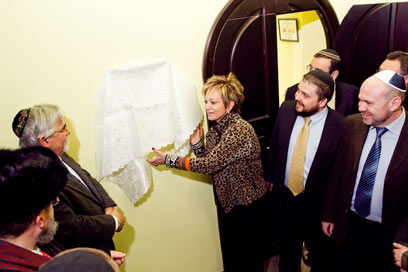
Inauguration of Shorashim center in Moscow (Photo: Shorashim)
It wasn't an unusual thing to do at the time. Many chose to hide their Jewish nationality, as it caused difficulties in almost every field: From applying to universities, through getting a job, to the general treatment by the Soviet authorities.
When the girl grew up, she was asked to pick a nationality. She made the right choice as far as the authorities were concerned: Ukrainian. It wasn't such a good choice in terms of what the future had to hold.
After she married and immigrated to Israel, the choice made by N.'s mother remained as an indelible stain on her children's identity cards. Her daughter tried to make things right.
"As far as we were concerned, it was a reliable story," says Rabbi Shimon Har Shalom, director of the Shorashim center, which helps verify Jewish status. "We reached the grandmother in Russia, spoke to her and confirmed the story."
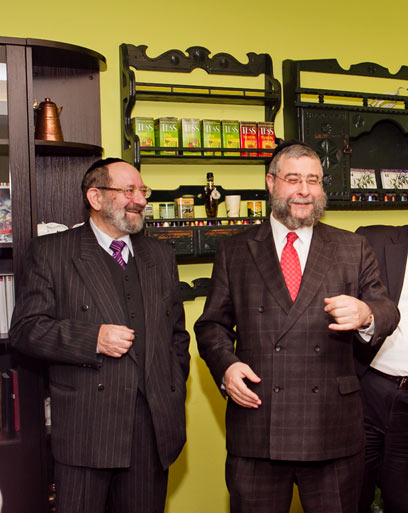
Rabbi Goldschmidt and Rabbi Shayevich (Photo: Shorashim)
The Shorashim center didn't settle for the testimony, and purchased equipment to verify certificates. "In Israel it is checked in the forensics, when the court questions the certificate's reliability, but it takes a long time," explains Rabbi Har Shalom.
"We were properly trained to check the documents, and then we examined the certificates. We could see exactly where the grandmother forged her nationality, and N. and her family received confirmation for their Jewishness."
Disappearing generation
This incident represents just one among thousands of stories of former USSR residents, who suddenly discover that their Jewish status is questioned and has been worn out due to 70 years of Communism.
"The Stalinism destroyed not only the community, but the family too," says Rabbi Pinchas Goldschmidt, the spiritual leader of the Moscow Choral Synagogue, head of the rabbinical court of the CIS, and president of the Conference of European Rabbis.
"During the Soviet era Jews had no contact to Judaism: No Jewish organization and no culture. They lived like Russians and everything was hermetically shut down from all sides.
"Today too there is no community here in terms of a monthly fee to the community, for example. There are many Jews here according to Halacha, but they lack documents. The old generation, the one that still remembers, is disappearing – and the old evidence is forgotten."
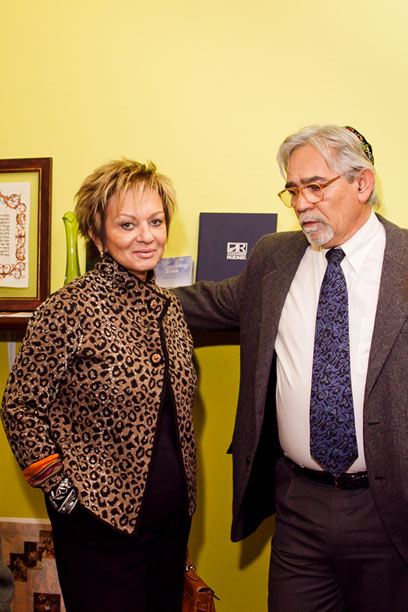
Shalom Norman with Israeli Ambassador to Russia Dorit Goldener (Photo: Shorashim)
This isn't just an Israeli problem, but a global-Jewish one. In the past 20 years, the Russian-speaking Jewish public is the most mobile public in the world. The population of Russian-speaking immigrants, who possess an Israeli passport as well, can be found in masses in England, the United States, Canada, Germany and other countries.
In North American alone, there are about 480,000 Jews who emigrated from Russia in the past 35 years. Some live in communities, most don't.
Officials handling the immigration from former USSR countries say that the first point of interface undermining the status of the second generation – the offspring of immigrants who grew up in Israel – emerges when they arrive to receive religious services.
Suddenly, those young people – many of whom are native Israelis – discover that they are not registered in Israel as Jews. This means they cannot get married in Israel (or be buried as Jews), leading to complete undermining of the Israeli awareness among hundreds of thousands of citizens and the establishment of a society within a society.
Some solve it through civil marriage, which generates the foundation of genealogical trees, and leads to an incorrigible split within the Jewish society in general, and the Israeli society in particular.
From passport forgery to assimilation
In 2005, the Tzohar rabbis' organization decided to deal with the problem through the Shorashim project, which provides information to immigrants from the former USSR (and other countries) and helps them clarify their Jewish status when dealing with the rabbinical establishment.
The association is aided by the Prime Minister's Office and sponsored by the Harry O. Triguboff Foundation and the Toronto Friendship – the Dov Friedberg Charitable Fund.
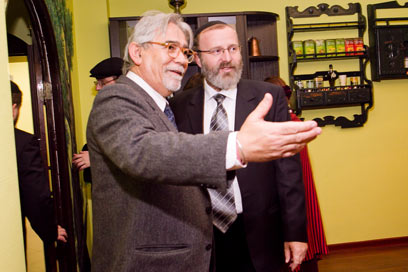
'We speak both the citizen's language and the court's language' (Photo: Shorashim)
Last week, six and a half years later, Shorashim decided to inaugurate an office in Moscow.
"The problem is not just the 10% of those 320,000 people with no religious status, but also the 700,000 immigrates who allegedly arrived as Jews," explains Rabbi Har Shalom. "When they arrive to receive religious services, they discover that they are actually not considered Jewish until proven otherwise."
But before we start lashing out at the Rabbinate, we must understand the reality created in the 1990s, when the gates were opened: "Many people arrived in Moscow from across the Soviet Union to prove that they're Jewish," says Russia's Chief Rabbi Adolf (Avraham) Shayevich.
"There was no rabbinical court at the time. I was basically alone, with no experience in this field. There were people who deceived us in all kinds of ways. People forged certificates and sold them, especially those seeking to immigrate to Germany."
"Arriving in Israel in the 1990s was considered a bargain, and one could obtain certificates practically on a daily basis," Rabbi Har-Shalom confirms. "Moreover, in the 70 years of Communism there were no addresses and no community records."
Communist records accepted by Rabbinate
The opening of the Moscow office, initiated by the local Jewish community is not an insignificant matter: For the first time, the rabbinical court in Moscow cooperated with a semi-formal Israeli association, which involves the rabbinical courts and the Prime Minister's Office.
"The court trusts us," states Rabbi Har Shalom. "We provide a professional opinion at their request, and it is accepted. The court investigator cannot reach the grandmother living in Ukraine and talk to her in her own language. The court even finds it difficult to reach (the southern Israeli city of) Ofakim. Therefore, they direct their questions to us.
"On the one hand, we stand by the citizen and speak his or her language, and on the other hand, we also speak the court's language."
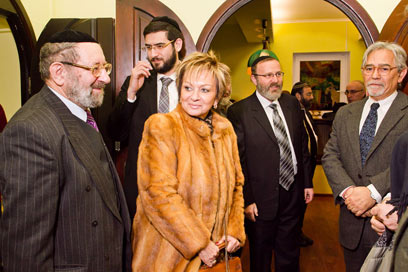
The biggest proof, perhaps, for the uniqueness of this cooperation is the unbelievable diversity of guests at the office's inauguration. Israeli Ambassador to Russia Dorit Goldener, representatives of the Liaison Bureau Nativ at the Embassy, head of the Joint organization in Russia, head of the Jewish Congress, Jewish community leaders, Rabbi Shayevich, Rabbi Goldschmidt and members of the rabbinical court of the CIS all gathered in a relatively small room in the Jewish community offices, near Moscow's Great Synagogue.
"Consensus," as defined by Rabbi Har Shalom. "In the situation created, people didn't know there were solutions to clarify their status. For example, the rabbinical courts, ironically, receive the Communist records, while today's records are less acceptable. The Communists were obsessive about recording stuff, so their nationality certificates are considered accurate both by the Interior Ministry and the Rabbinate."
There is also a consensus regarding the feeling of urgency, stemming from the fear that the last window of opportunity to solve the problem of proving the Jewish status of hundreds of thousands of Israeli citizens is being shut down, even slammed.
"Our possibilities are diminishing," says Rabbi Har Shalom. "The option regarding things that can be confirmed today will be closed to us in several years, and there's no need to explain what that involves."
But Shalom Norman, director of the Harry Triguboff Foundation in Israel, explains: "The annual budget of the state conversion system is NIS 40 million ($10.5 million). It has 2,200 converts a year, 800 of whom are soldiers, so we are doing something vital for the State – both in terms of essence and financially."
Don’t shy away from any method
Rabbi Har Shalom reports of a dramatic rise in the number of cases opened since early 2011 – 578, as well as a rise in the number of cases closed (535). About 84% of them received confirmation of their Jewish status, which exempts the applicants and their families from requiring conversion processes in the future.
This applies, the project managers clarify, not just to the applicant, but to his or her family members as well – an average of five people. The Shorashim institute's work has led to some 2,700 approvals of Jewish status in one year alone.
But the high number of permits does not necessarily attest to the Jewish status of those who have yet to seek verification.
"We only deal with those who claim they were born Jewish, and that's the target audience that comes to us," says Rabbi Har Shalom. "However, we don't control the number of applicants and their quality. We only check facts, and try to utilize our abilities to the fullest."
Shorashim officials say they don't shy away from any method to reach proof: From traveling to godforsaken places in an attempt to locate live evidence of the applicants' Jewish status – and up to detecting documents which are very difficult to access in a bid to "assemble the puzzle into a complete picture."
And so, the average time of handling a case, when there are documents – stands at about three weeks.
Yiddish is proof of Judaism too
Norman, who has been dealing with the former USSR Jewry for several decades now, is not a religious person. He says, however, that the thing that bothers him most is the split within the global Jewish society as a result of the homogenous non-recognition of immigrants' Jewish status.
"Even before Jewish awareness, we have an important challenge of bringing the Jewish people together," he says. "You can't sustain a society of status-less people. You can't sustain a society of genealogical trees. The situation created is no one's fault, but a reality created as a result of a mobile multi-cultural community.
"A week ago we marked the 70th anniversary of the Wannsee Conference, and the anniversary of the liberation of Auschwitz takes place this week. We don't have to complete the work that others have failed to complete. We must do everything to unify the concept of being Jewish.
"Within those 320,000 status-less people, there is a significant number of Jews, but in their great enthusiasm when the gates were just opened – they didn't make any effort to find the certificates under the ground, but settled for a Jewish father's certificate they had access to.
"You must understand that what we can do today we may not be able to do in five or 10 years, because the rules we conform to – including the personal testimony – are becoming obsolete. Archive sources are also closing up to us."
"What's missing today is knowledge of Yiddish," adds Rabbi Goldschmidt. "A grandmother who speaks Yiddish is proof of Jewishness. Up until 20 years ago, there were Yiddish speakers among immigrants from the former USSR, but not anymore."
Challenge: Marketing
Although it is clear to a significant part of the Israeli and Jewish establishment that this is a necessary operation, the Shorashim project is aware of the antagonism its activity raises among those required to prove their Jewish status on the one hand, and the indifference of other parts in the target audience.
Only half a year ago, a ship carrying 150 Israeli couples, in which either the bride or groom are not recognized as Jewish, traveled to Cyprus for a mass wedding ceremony.
"The big challenge we are facing is the way to market to this public the fact that it has a problem, to explain that those who come to us today will only save time and get a confirmation which will prove to be essential at a later stage in their life," says Norman.
"Even if they currently say to themselves that they can get along in Israel without an authorization of their Jewish status, later in life they may meet someone who will want to marry a Jew. We see it mainly among couples in which the man or woman comes from a Sephardic family."
In the meantime, an experiment is taking place in the southern city of Ashdod. "The grandfather and grandmother understand better than the young generation that the problematic situation we are facing does not stem from paternalism – but from a true reality. They understand the historic context," explains Rabbi Har Shalom.
Not giving up on any Jew
Because it is an association, handling a case overseas is free of charge as well. The State of Israel does not cover the expenses, "but because this is such an acute matter, we don't wait," says Norman.
"We have done a lot in the Zionist Movement to bring them to Israel, but have failed to complete one thing: Give them the final stamp establishing their status in Israel."
There are some 159,000 Jews registered in Russia today, but their real number ranges between 350-450,000. About 250,000 of them live in Moscow.
"Each and every one of the Jews of Moscow considering immigrating to Israel today thinks about the confirmation of his or her Jewish status," says Rabbi Goldschmidt.
"There is severe assimilation here – and as serious is the phenomenon of converting to Orthodox Christianity, both because it is always easier to assimilate into the majority and because many Jews have no contact with the Jewish community, and their first spiritual connection is with Christianity.
"When we rule that a person's Jewish status has been verified, it is accepted all over the world and receives an automatic stamp in Israel as well, easing the immigrants' hardship."
"No so long ago I went to the theater and met an 18-year-old girl with a Star of David necklace," says Ambassador Dorit Goldener. "She approached me with tears in her eyes, saying she wants to immigrate to Israel through the MASA program but cannot prove that she is Jewish.
"She told me, 'My mother died, my grandmother lives far away in Russia, and I have nowhere to get documents from. But it doesn't matter if I can prove it or not, I'll get to Israel one way or another.'"
Such a girl can go to the Shorashim center, where they will help her solve the problem – and that's worth everything."










